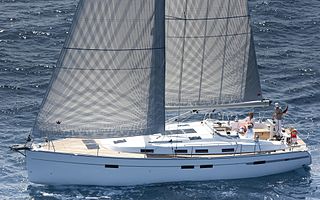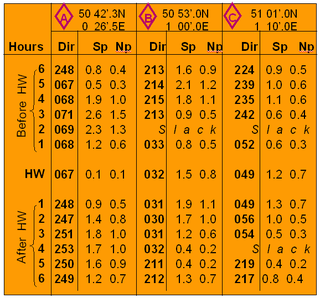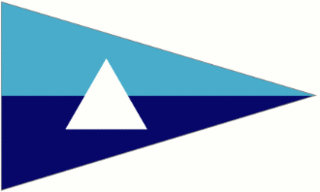
Yachting is recreational boating activities using medium/large-sized boats or small ships collectively called yachts. Yachting is distinguished from other forms of boating mainly by the priority focus on comfort and luxury, the dependence on marinas for docking, and being typically only for exclusive social leisures such as cruising, fishing trip or racing.

A yacht is a sail- or motor-propelled watercraft made for pleasure, cruising, or racing. There is no standard definition, though the term generally applies to vessels with a cabin intended for overnight use. To be termed a yacht, as opposed to a boat, such a pleasure vessel is likely to be at least 33 feet (10 m) in length and may have been judged to have good aesthetic qualities.

Seamanship is the art, competence, and knowledge of operating a ship, boat or other craft on water. The Oxford Dictionary states that seamanship is "The skill, techniques, or practice of handling a ship or boat at sea."

Tidal diamonds are symbols on British admiralty charts and others that indicate the direction and speed of tidal streams.
Sail Canada is Canada's governing body for the sport of sailing. Sail Canada is a "Member National Authority" of World Sailing. Organization of sailing in Canada is divided into four groups: yacht clubs, Provincial Sailing Associations, class associations, and Sail Canada itself.

An International Certificate of Competence (ICC) is a certificate that may be issued to anyone who has successfully completed certain national boating licenses or has passed an examination to prove the necessary competence for pleasure craft operation. ICC is the only sailing license approved by United Nations as a legitimate recreational sailing license.

A sailing yacht, is a leisure craft that uses sails as its primary means of propulsion. A yacht may be a sail or power vessel used for pleasure, cruising, or racing. There is no standard definition, so the term applies here to sailing vessels that have a cabin with amenities that accommodate overnight use. To be termed a "yacht", as opposed to a "boat", such a vessel is likely to be at least 33 feet (10 m) in length and have been judged to have good aesthetic qualities. Sailboats that do not accommodate overnight use or are smaller than 30 feet (9.1 m) are not universally called yachts. Sailing yachts in excess of 130 feet (40 m) are generally considered to be superyachts.

The London Corinthian Sailing Club is based on the river Thames at Hammersmith. Its activities include Dinghy sailing and racing on the river, and yachting in the Solent and further afield, as well as an active social side including 'Club Nights' every Tuesday evening.

A Yachtmaster qualification is a certificate of competence of the ability to handle either a sailing boat or motor boat in certain prescribed conditions. Three different titles are specified; Yachtmaster Coastal, Yachtmaster Offshore, and Yachtmaster Ocean which specify the level of competence required and the area of operation certified.
Competent Crew is the entry-level course of the Royal Yachting Association for those who wish to be active crew members of a sailing yacht. It is a hands-on course and by the end of the course participants should be able to steer, handle sails, keep a lookout, row a dinghy and assist in all the day-to-day duties on board.
A coastal skipper is a yachtsman or woman who has the ability to skipper a yacht in coastal waters by day or night. There is a shore-based course which provides the background knowledge required, a practical course which teaches the skills and techniques required, and a Certificate of Competence.
International Yacht Training Worldwide is an independent sailing and boating training organization which provides education and training standards for professional and recreational boaters and yachtsmen and women. It was originally based entirely in Fort Lauderdale, Florida, USA; it is now a British Columbia, Canada Corporation based in Kelowna. Its qualifications are similar to those of the Royal Yachting Association (RYA) at the recreational level, but IYT Worldwide also offers additional courses at the professional level. It is regulated by a number of Maritime Administrations and has an ISO Quality Management System to independently monitor and control all of its training standards. The IYT recreational yacht training system goes from introductory sailing through to Yachtmaster Ocean.
A tidal atlas or a tidal stream atlas is used to predict the direction and speed of tidal currents.

UKSA in Cowes is a youth charity offering professional maritime training opportunities, youth development programs and school/ group residential trips. The charity was founded in 1987 by MFI entrepreneur Noel Lister. He purchased a Sports Council building with the intention of giving young people the opportunity to experience adventurous maritime activities. Since then UKSA has expanded now owning multiple buildings housing a wide range of facilities which are used to provide a wide range of maritime related actives, professional training and asset in support their charitable works.
Tom Cunliffe is a British yachting journalist, author and broadcaster.
SailTimer is a technology for sailboat navigation, which calculates optimal tacking angles, distances and times.
Premier Marinas Limited, owned by the Wellcome Trust, is based in Hampshire. It owns and manages nine coastal marinas and boatyards in England. Premier’s marinas are situated on the south coast at Falmouth in Cornwall; Noss on Dart in Dartmouth; Swanwick, Universal Marina, on the hamble, Gosport, Port Solent and Southsea in Hampshire; and Chichester, Brighton and Eastbourne in Sussex. Premier Marinas’ core business is the ownership, management and development of these marina sites, including the provision of wet and dry berthing and boatyard services to leisure yachts and motorboats. The company hosts boat shows, including an annual boat show that has been occurring for over thirty years.

The Little Ship Club is a yacht club in London. It was founded in 1926 by a group of yachtsmen for the purpose of providing training and lectures over the winter months. The club operates from its riverside clubhouse at Bell Wharf on the River Thames, and is the only one operating from within the City of London.

Greenwich Yacht Club is a sailing club based in Greenwich, London. It was founded in 1908, and caters for cruiser sailors, dinghy sailors, motor-boaters and rowers. Its officers include a commodore, vice-commodore, rear-commodore, secretary and treasurer. The club is affiliated to the Royal Yachting Association.

Horning Sailing Club is a sailing club in Horning, Norfolk, England. The club provides dinghy racing, yacht racing, yacht cruising, motor boating, personal watercraft facilities and is a representative for Broadland inland waterways cruising. HSC is an RYA Training Centre and an RYA Sailability Centre











